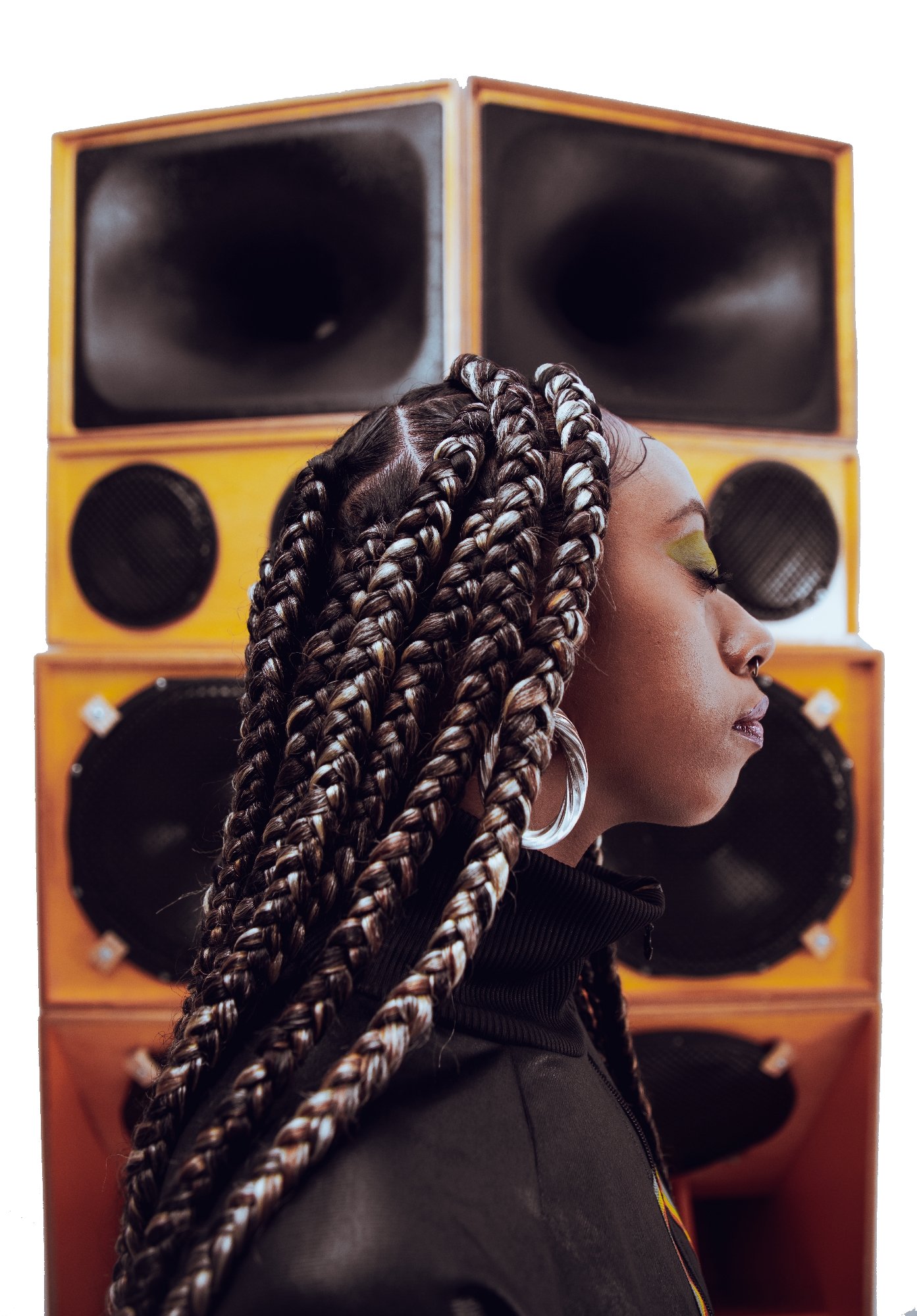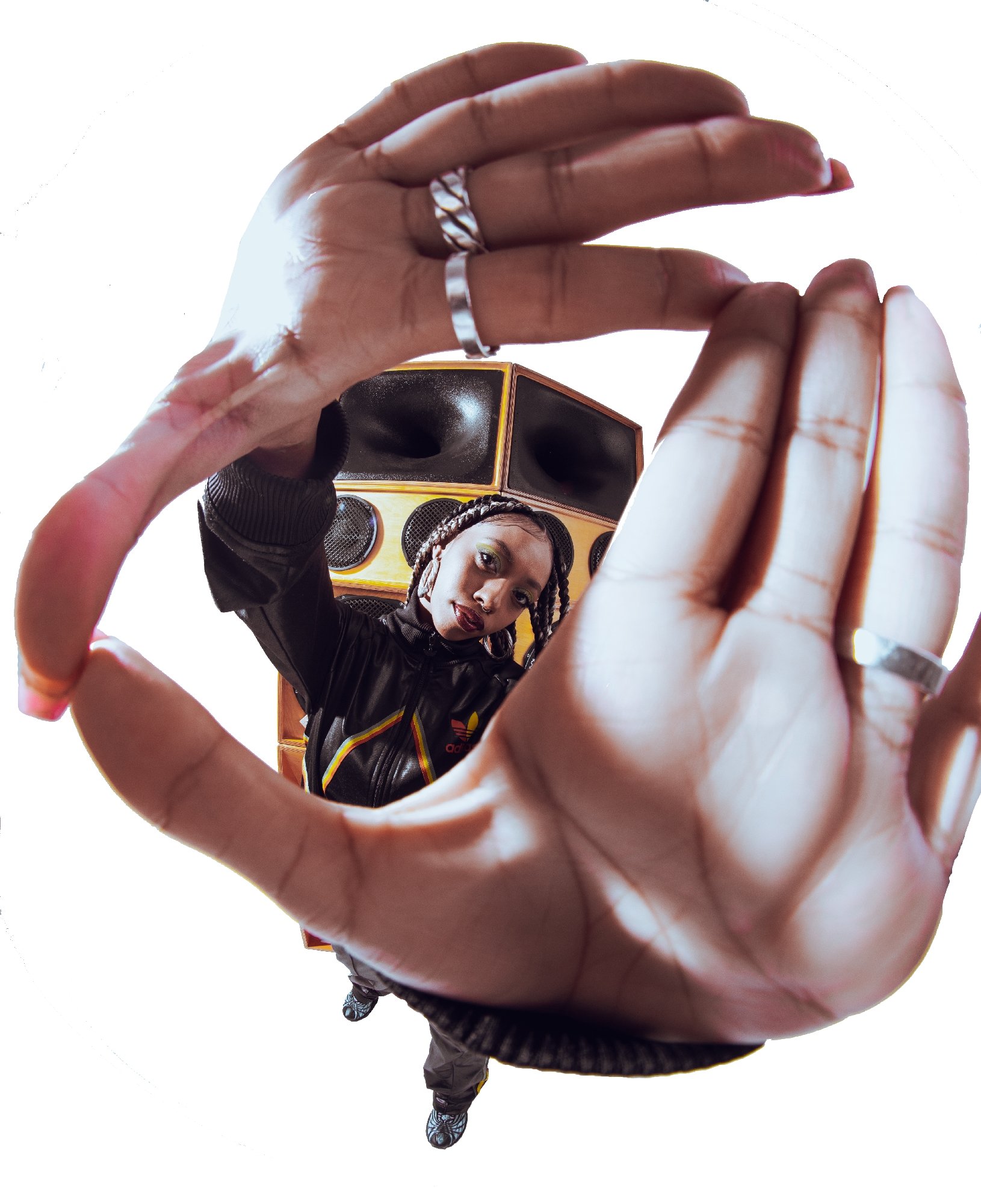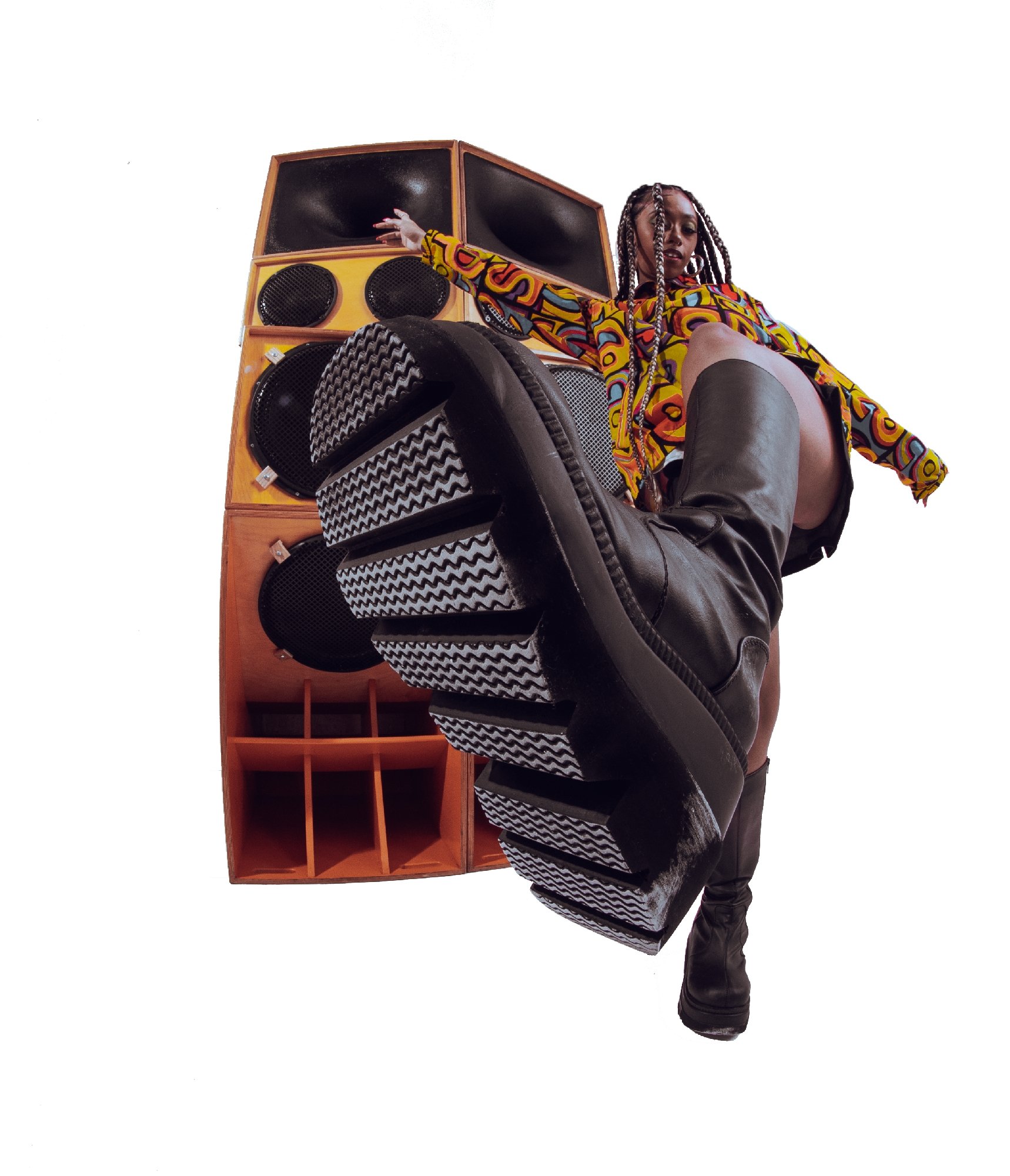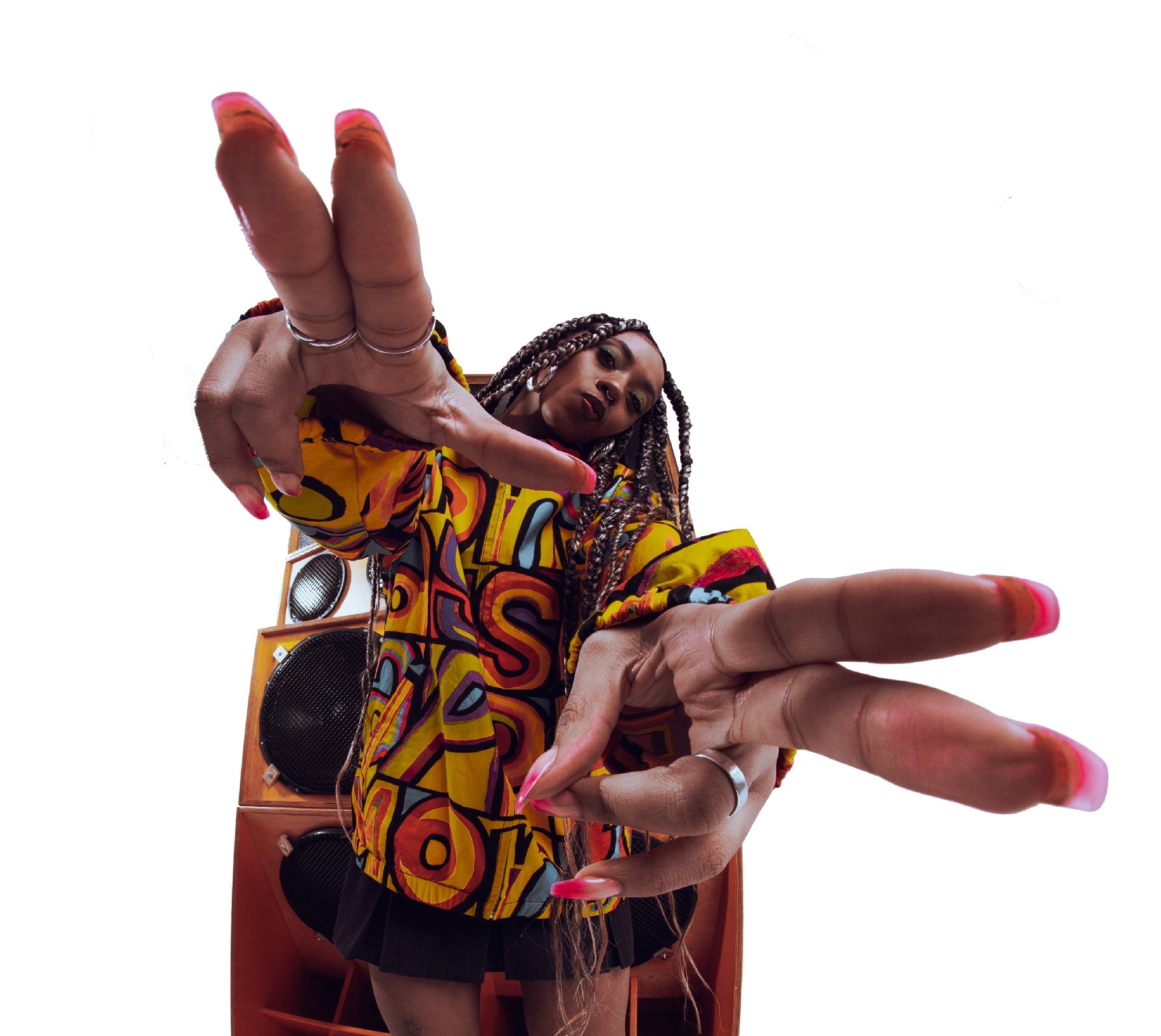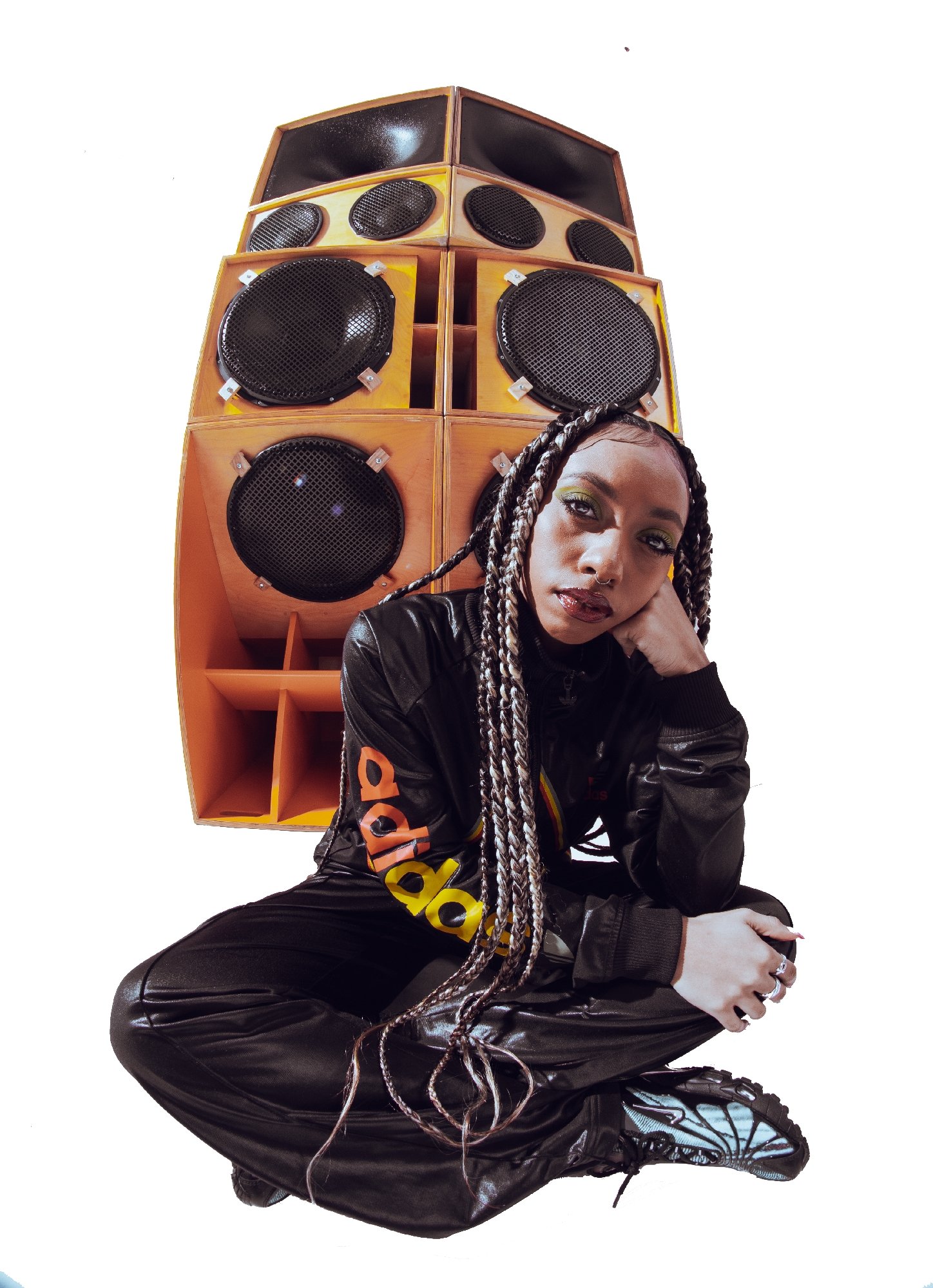This breakout star makes a Nataal playlist and tells us how she’s inspiring young Black women to get into jungle
Since its inception in the early 90s, jungle has remained one of the most exhilarating genres to rise from UK soils thanks to its dizzying breakbeat rhythms, gut-wrenching basslines, funky melodies and hypnotic samples. Now a new generation of artists, producers and DJs have embraced this old school sound, chopping it up with fresh influences while staying close to the genre’s fundamentals. Nia Archives is one such artist. The DJ, singer-songwriter, producer and visual artist conjures up mind-bending, lo-fi jungle soundscapes laced with dub, neo-soul and hip hop and has attracted a cult-like following.
Bradford-born and Leeds-raised, she grew up heavily influenced by Jamaican sound system culture. A move to Manchester in her early teens immersed her in its rave scene where she found a sense of comfort and community and started making hip hop. Now citing influences as far reaching as Maya Angelou and Roni Size, she creates her own experimental sounds and is a resident DJ on Rinse. Following last year’s bedroom-made EP ‘Headz Gone West’, and hot on the heels of winning Best Producer at the 2022 NME Awards, she returns with her keenly-expected, hallucinogenic sophomore EP ‘Forbidden Feelingz’. Here, she makes a Spotify Playlist for Nataal and speaks to us about her journey so far.
Who are some of your jungle DJ and producer influences?
There’s so many. I’m a massive fan of the early jungle sound. I love Roni Size, Lemon D and Remark, who’s crazy with the breaks and the way he chops them up. From a woman’s perspective, Kemistry & Storm were the pioneers. And for more contemporary people that I’m inspired by, I really love Tim Reaper, Coco Bryce and Sully.
What was your journey into making music?
I taught myself how to play the piano as a kid and then when I was 16, I moved to Manchester and music became a therapeutic thing for me. That's how I found my people and started making music. At first, I was making hip hop with other producers but that was long so I downloaded a crap version of Logic and watched a few YouTube videos and just taught myself. It’s been five years now and I feel like I’m just starting to get somewhere and find my sound.
How have you gone about honing that sound?
What’s helped me is my obsession with the music. A lot of people are just jumping on jungle but I've watched every documentary to get to know the original junglists and the elders in the community. I’ve met Roni, Clipse, Flight. That’s why you can hear the realness in my music because I've taken the time to research the sound. Back in the day everybody had their own sound, so I feel like my drums are my USP. I’m very obsessive with my drums. I literally sit and listen to drum loops for hours - no melody, no bass, just the drums on loop.
What are some things you’ve learnt as you navigate such a heavily male-dominated scene?
I actually did a mentorship with EQ50, which was started by DJ Flight and DJ.Mantra to create fair representation in drum & bass for women and non-binary people. I’m not afraid to speak up about the fact that it’s so boring going to a rave and it’s the same white men DJing. I’m tired of it and think diversity makes things a lot more interesting. When you look at footage of the original raves, it was so mixed. This is music of Black origin but it’s been so gentrified and white-washed that Black people don’t even see themselves. Now though, I notice that there’s a lot of Black girls and women that come to my raves. I feel like I’m changing the game in a sense because they see themselves in this music and want to go and be a part of that.
You’re known for your DIY approach to creativity. How important is having complete control over your music and visuals but also leaving room for collaboration?
As a kid I used to have a camcorder and film everything, so I like to keep that mentality of doing things for my inner child. I think it’s important to be involved in the creative side and so I write all the treatments for my videos so the person I’m working with can understand what the song means to me. With my art I want to make something timeless and feel like I’m leaving something behind. I’m always thinking about legacy - how would this be perceived and how would this age?
You’ve lived in Leeds, Bradford, Manchester and London. How influential have the UK’s different regional sub-cultures been to your artistic expression?
It’s hugely impacted who I am as a person. I grew up in poverty, so I know what it’s like to struggle and those transitions between cities just really levelled me out as a person. Moving to London you can get so caught up in the ‘Are you important?’ whereas I think for me, having that northern root keeps me grounded and I can just be real. All my art is me expressing myself rather than doing it for clout. I’ve experienced so much in my life and each place has given me something to talk about.
What emotions, experiences or ideas fuelled the creation of ‘Forbidden Feelingz’?
I made this last year and it’s based on a sample from the 70s detective series ‘Columbo’, which I used to watch with my grandma Liz, so it’s like a homage to her. It’s probably one of my favourite beats I’ve made so far and this whole project is about navigating adulthood and learning to sit with my emotions instead of constantly relying on escapism. It's quite a dark message but the tune is so high energy that it makes me feel quite euphoric.
Talking of samples, tell us about why you sampled Maya Angelou on the EP’s first track, ‘Ode to Maya Angelou’?
Growing up, my nana had her books on her bookcase and I read all of them. As I got older, I watched a few documentaries about her life and was in awe of this woman. I can relate to a lot of the situations she’s been through and I wanted to honour her so I sampled ‘I Know Why The Caged Bird Sings’. Black history is such a big part of who so I feel like people should know about her if they don’t already.
How do you hope listeners will receive this project?
I’ve been listening to it for months now so it’s an emotional release for me. I hope people take it in and maybe relate it to their life situations or experiences but they’ll probably listen to it very differently to how I’ve made it and how I listen to it. For me, it’s like a diary whereas other people may listen to it and go out raving.
What can you tell us about the production of the EP?
If you listen to my first EP and this new one you can definitely hear the growth and development of me as a producer, which was really important. I feel like this is my ‘flag in the sand’ moment as a producer because I've dealt with a lot of ignorant comments from people being like, ‘Oh so do you produce your own stuff or…?’. If I was a white man, you wouldn't ask that. I’m excited to show people that yeah, I am a producer and I am making jungle and I’m singing on top of it. Not in an ego way but it’s not that shocking. Your gender doesn’t have anything to do with pressing buttons. I’m excited to show people that it’s about pure love for the music, hard work, talent and dedication. I’m hoping that me doing what I’m doing will inspire a whole generation of young Black women to do the same.
What are some production tips you would give to someone who’s at the early stages of their own journey?
Make the music that you want to hear. Music should be a selfish experience – you’re going to make the most interesting and unique sound because you’re literally making it for you. And then just stick with it because you’re not going to be amazing overnight.
You’re in the process of creating Hijinxx. Could you speak a bit about its vision?
There’s a skater called Begod and he coined the term ‘hijinxx’, which is basically capturing all the chaotic, crazy and mischievous moments of life. Before I was doing music, Nia Archives was a visual and sonic archive of my life, and that's how I came up with the name. So, in the future if I wanted to start a label or throw events I would put it under Hijinxx. I don't know what it’s going to be yet, it’s still under early development.
What other projects can we expect to see from you next?
I’ve got some really exciting collaborations and some big features that are coming out this year with some artists that I really love. I’ve already started working on my next EP and I’m going to be doing a lot of big festivals and loads of gigs. I’m just excited to travel, DJ and make music.
‘Forbidden Feelingz’ by Nia Archives is out now. Discover it here .
Words Blessing Borode
Photography Melissa Gardner
Visit Nia Archives
Published on 30/03/2022



